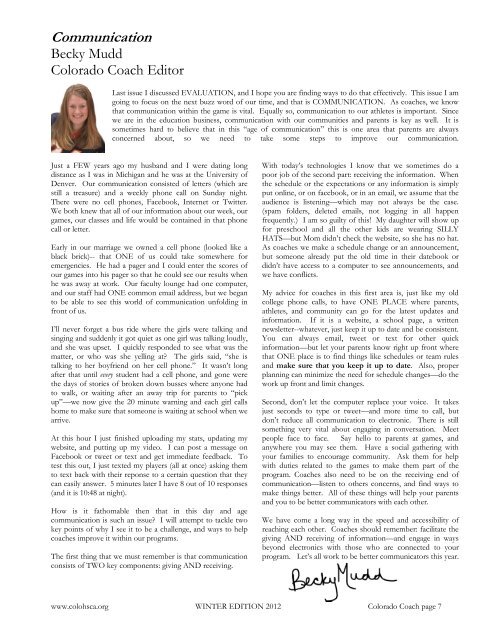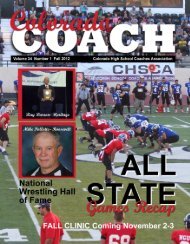winter 2012-2013 colorado coach - Colorado High School Coaches ...
winter 2012-2013 colorado coach - Colorado High School Coaches ...
winter 2012-2013 colorado coach - Colorado High School Coaches ...
- No tags were found...
Create successful ePaper yourself
Turn your PDF publications into a flip-book with our unique Google optimized e-Paper software.
CommunicationBecky Mudd<strong>Colorado</strong> Coach EditorLast issue I discussed EVALUATION, and I hope you are finding ways to do that effectively. This issue I amgoing to focus on the next buzz word of our time, and that is COMMUNICATION. As <strong>coach</strong>es, we knowthat communication within the game is vital. Equally so, communication to our athletes is important. Sincewe are in the education business, communication with our communities and parents is key as well. It issometimes hard to believe that in this “age of communication” this is one area that parents are alwaysconcerned about, so we need to take some steps to improve our communication.Just a FEW years ago my husband and I were dating longdistance as I was in Michigan and he was at the University ofDenver. Our communication consisted of letters (which arestill a treasure) and a weekly phone call on Sunday night.There were no cell phones, Facebook, Internet or Twitter.We both knew that all of our information about our week, ourgames, our classes and life would be contained in that phonecall or letter.Early in our marriage we owned a cell phone (looked like ablack brick)-- that ONE of us could take somewhere foremergencies. He had a pager and I could enter the scores ofour games into his pager so that he could see our results whenhe was away at work. Our faculty lounge had one computer,and our staff had ONE common email address, but we beganto be able to see this world of communication unfolding infront of us.I’ll never forget a bus ride where the girls were talking andsinging and suddenly it got quiet as one girl was talking loudly,and she was upset. I quickly responded to see what was thematter, or who was she yelling at? The girls said, “she istalking to her boyfriend on her cell phone.” It wasn’t longafter that until every student had a cell phone, and gone werethe days of stories of broken down busses where anyone hadto walk, or waiting after an away trip for parents to “pickup”—we now give the 20 minute warning and each girl callshome to make sure that someone is waiting at school when wearrive.At this hour I just finished uploading my stats, updating mywebsite, and putting up my video. I can post a message onFacebook or tweet or text and get immediate feedback. Totest this out, I just texted my players (all at once) asking themto text back with their reponse to a certain question that theycan easily answer. 5 minutes later I have 8 out of 10 responses(and it is 10:48 at night).How is it fathomable then that in this day and agecommunication is such an issue? I will attempt to tackle twokey points of why I see it to be a challenge, and ways to help<strong>coach</strong>es improve it within our programs.The first thing that we must remember is that communicationconsists of TWO key components: giving AND receiving.With today’s technologies I know that we sometimes do apoor job of the second part: receiving the information. Whenthe schedule or the expectations or any information is simplyput online, or on facebook, or in an email, we assume that theaudience is listening—which may not always be the case.(spam folders, deleted emails, not logging in all happenfrequently.) I am so guilty of this! My daughter will show upfor preschool and all the other kids are wearing SILLYHATS—but Mom didn’t check the website, so she has no hat.As <strong>coach</strong>es we make a schedule change or an announcement,but someone already put the old time in their datebook ordidn’t have access to a computer to see announcements, andwe have conflicts.My advice for <strong>coach</strong>es in this first area is, just like my oldcollege phone calls, to have ONE PLACE where parents,athletes, and community can go for the latest updates andinformation. If it is a website, a school page, a writtennewsletter--whatever, just keep it up to date and be consistent.You can always email, tweet or text for other quickinformation—but let your parents know right up front wherethat ONE place is to find things like schedules or team rulesand make sure that you keep it up to date. Also, properplanning can minimize the need for schedule changes—do thework up front and limit changes.Second, don’t let the computer replace your voice. It takesjust seconds to type or tweet—and more time to call, butdon’t reduce all communication to electronic. There is stillsomething very vital about engaging in conversation. Meetpeople face to face. Say hello to parents at games, andanywhere you may see them. Have a social gathering withyour families to encourage community. Ask them for helpwith duties related to the games to make them part of theprogram. <strong>Coaches</strong> also need to be on the receiving end ofcommunication—listen to others concerns, and find ways tomake things better. All of these things will help your parentsand you to be better communicators with each other.We have come a long way in the speed and accessibility ofreaching each other. <strong>Coaches</strong> should remember: facilitate thegiving AND receiving of information—and engage in waysbeyond electronics with those who are connected to yourprogram. Let’s all work to be better communicators this year.www.colohsca.org WINTER EDITION <strong>2012</strong> <strong>Colorado</strong> Coach page 7








